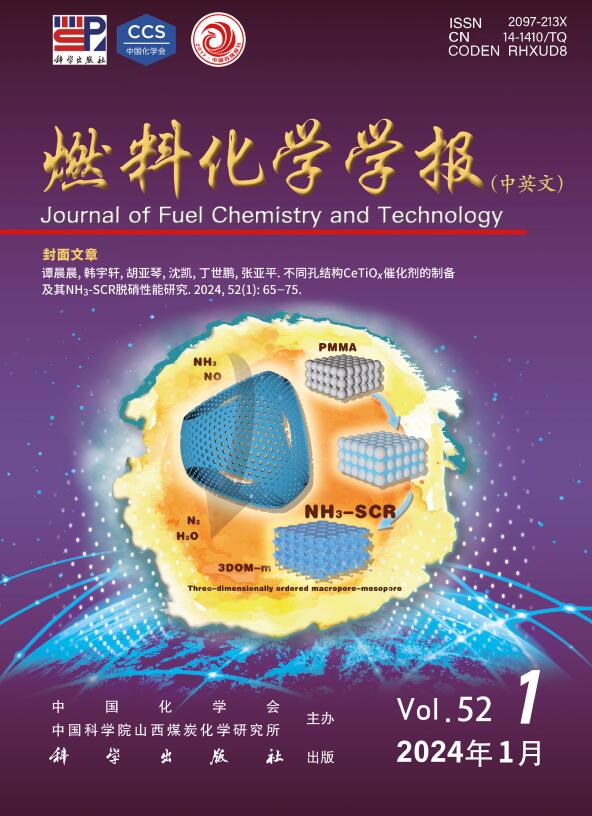Research progress on Cr-based catalysts for the CO2-assisted catalytic oxidative dehydrogenation of light alkanes to light olefins
Q3 Energy
引用次数: 0
Abstract
Under the background of rapid consumption of crude oil and the impact of the “dual carbon” policy, utilizing light alkanes, which have a wider range of sources, as starting materials to prepare light olefins through dehydrogenation has become the most promising way to solve the problem of insufficient feedstock supply. Cr-based catalysts are attractive for their high activity and low cost. This paper reviews the current state of research on different process routes for the dehydrogenation of light alkanes to olefins, the reaction mechanism of oxidative dehydrogenation over Cr-based catalysts as well as the active sites were investigated and reviewed. CO2 as a weak oxidant in light alkanes dehydrogenation can alleviate the thermodynamic equilibrium limit, effectively inhibit the coking, decrease the reaction temperature and reduce energy consumption. In addition, Cr-based catalyst supports have been summarized and systematically classified. The interaction between Cr species and supports can be improved by introducing metal additives and modifying the supports, which in turn affects the dispersion and the state of Cr species. Finally, future challenges and directions for developing Cr-based catalysts for further industrial applications are discussed.
co2辅助催化轻烷烃氧化脱氢制备轻烯烃的cr基催化剂研究进展
在原油快速消耗和“双碳”政策影响的背景下,利用来源广泛的轻质烷烃作为原料脱氢制备轻质烯烃已成为解决原料供应不足的最有希望的途径。铬基催化剂以其高活性和低成本的特点而备受关注。综述了轻烷烃氧化脱氢制烯烃的不同工艺路线的研究现状,对cr基催化剂氧化脱氢的反应机理及活性位点进行了研究和评述。在轻烷烃脱氢过程中,CO2作为弱氧化剂可以缓解热力学平衡极限,有效抑制焦化,降低反应温度,降低能耗。此外,还对cr基催化剂载体进行了总结和系统分类。通过引入金属添加剂和对载体进行改性,可以改善Cr与载体之间的相互作用,从而影响Cr的分散和状态。最后,讨论了今后发展cr基催化剂的挑战和方向。
本文章由计算机程序翻译,如有差异,请以英文原文为准。
求助全文
约1分钟内获得全文
求助全文
来源期刊

燃料化学学报
Chemical Engineering-Chemical Engineering (all)
CiteScore
2.80
自引率
0.00%
发文量
5825
期刊介绍:
Journal of Fuel Chemistry and Technology (Ranliao Huaxue Xuebao) is a Chinese Academy of Sciences(CAS) journal started in 1956, sponsored by the Chinese Chemical Society and the Institute of Coal Chemistry, Chinese Academy of Sciences(CAS). The journal is published bimonthly by Science Press in China and widely distributed in about 20 countries. Journal of Fuel Chemistry and Technology publishes reports of both basic and applied research in the chemistry and chemical engineering of many energy sources, including that involved in the nature, processing and utilization of coal, petroleum, oil shale, natural gas, biomass and synfuels, as well as related subjects of increasing interest such as C1 chemistry, pollutions control and new catalytic materials. Types of publications include original research articles, short communications, research notes and reviews. Both domestic and international contributors are welcome. Manuscripts written in Chinese or English will be accepted. Additional English titles, abstracts and key words should be included in Chinese manuscripts. All manuscripts are subject to critical review by the editorial committee, which is composed of about 10 foreign and 50 Chinese experts in fuel science. Journal of Fuel Chemistry and Technology has been a source of primary research work in fuel chemistry as a Chinese core scientific periodical.
 求助内容:
求助内容: 应助结果提醒方式:
应助结果提醒方式:


